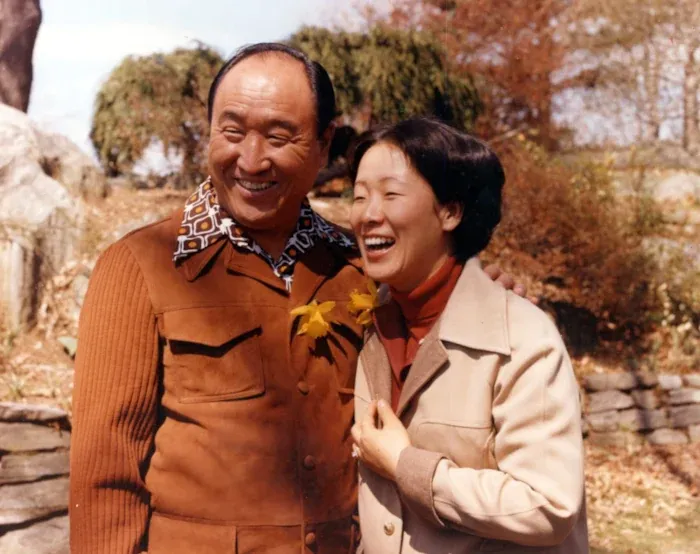True Parents among Father’s relatives in 1991; Father’s close relatives wept, but he told them, “Don’t cry. I did not come for tears; I came for God’s mission. We have much greater things to do.”
This story is Father’s testimony. It consists of extracts from the Father’s speeches given over 5 decades, drawn from his account of his life and personal experiences, and patched together to create a memoir.
The books were originally compiled and published in Korean, and this is the English translation with additional material from separate sources.
The series originally ran in Today’s World monthly magazine from 2007 until 2012. The content is being slightly re-edited for the International HQ Mission Office website.
God originally wanted the whole human race to have just one hometown, the place where Adam’s family would have lived. Who would be the proprietor of that hometown? The proprietors should be God and True Parents, with God being the center.
If Adam and Eve had not fallen, they would have become one with God and become true parents at that time. Therefore, the place that centered around their realm of love would have become all of humanity’s hometown. If that had come about, God, the father, the mother, and the children would all have become one.
However, the opposite occurred. People became self-centered, centered on Satan’s love, and lost their hometowns. Humanity inherited satanic life through satanic love, and thus, people cannot stand in front of God.
Humanity was expelled; people lost their hometowns. Instead of receiving God’s life, it was from the devil that humanity received life. Though born of parents’ love, they were expelled because their lives were assuredly from the devil.
What occurred along with that? The human lineage became stained with the devil’s blood. Because human beings were of the devil’s lineage, they were expelled and became those who have lost their hometown.
From that perspective, what are God’s bitter pain and grief connected to?
The hometown! What about Jesus’ bitterness and grief? The hometown! What is the hope of the countless righteous people who have lived throughout history? The hometown!
Chongju County, North Pyeongan Province
Next, you must know about the realization of the homeland, which is the hope of religious people and humankind’s hope. Since the hometown of all humanity is wherever the True Parents were born, as members of humanity, your hometown must be the True Parents’ birthplace.
From the providential standpoint, Father’s birthplace should be your hometown, and that original hometown should be a sacred place.
You should cultivate the feeling that you were originally meant to have, deep within your heart, toward that hometown. Let us cultivate those original, deeply felt emotions toward that hometown! Where is the hometown toward which we might cultivate those original heartfelt sentiments?
Chongju County: Why Chongju? Why have Chongju and Korea become the hometown and the homeland? It is the conclusive will of God and was determined so that we might win over the world and return to God.
In the heart, the starting point and the ending point are the same. Our course should be a balanced one.
The name “Chongju” is good, isn’t it? Who determined the place of settlement? God did; God determined it. It was not determined by me or by the Korean people. It was determined by God, and undoubtedly, it is the fastest road to our hometown. Chongju is a good name, and it has the qualities to become the hometown of all people.
People from Pyong-an Province are like ferocious jungle tigers. Even people from Russia and China cannot match them. They are people who travel freely beyond boundaries. From that perspective, people from Pyong-an Province are people who can go beyond their boundaries; they also possess good diplomatic skills.
Do you know why people from Pyong-an Province are not given recognition in official positions? Because once given a position, they will take over everything. So don’t belittle them. In South Korea today, many of the people from the North are among those with economic power, and among them, many are from Pyong-an Province. Of course, there are also a few from [in South Korea] Gyeongsang Province and Gangwon Province, right? [Laughter]
The people from Pyong-an Province are enlightened. Why so? Because that is the original birthplace of Korean Christianity, and it was the first place in Korea to absorb Western civilization, the people think more quickly.
Many famous people emerged from Chongju County in North Pyeongan Province.
Chongju is famous. The center of the independence movement was not Seoul. And Christianity was at the center of the struggle with Communism. Like many powerful generals on the front line of a struggle, many famous people emerged from Pyong-an Province.
Even now, there may be famous people emerging from there. If Chongju county alone is mobilized, then North Pyong-an Province and the entire North will follow and will be mobilized in turn. Because of that, Kim Il-sung could control everything from Pyongyang.
Dokon Village, Sangsa Hamlet
There is a place called Dokon Village in Chongju County, North Pyeongan Province. That is my birthplace. Six hundred families settled there in an attempt to emerge from poverty. There were approximately three thousand people in those six hundred families.
The teaching of the Osan School was the core of Dokon Village, which is why many intellectuals emerged from there. Thus, even though they were fugitives from poverty, their intellectual level was high.
These people formed a villagers’ association among themselves. Even though scholarships were offered to the needy, they were refused. Even though they were poor, they would not accept help from others.
Those needy people said, “We will not accept any help; we will solve our problems by ourselves.” Furthermore, even if a bag of rice were offered to them because they were poor, they would refuse it.
So a scholarship and a bag of rice might be left unused. Dokon Village is like that because it is the place I was born, isn’t it? [Laughter] Twelve people from there graduated with a doctoral degree, and quite a few businessmen were from there.
When I observed the people from Chongju, I felt moved because their attitude was excellent.
I was born in what was then Doksong Village, Dokdal District, Chongju County, North Pyeongan Province. The Chinese characters for Chongju County, Dokdal District, mean “the place that achieved the standard of morality.” Those for Doksong Village mean “a place that reflects a standard of morality as high as the stars in heaven.”
The name was later changed to Dokon Village, and “on” in “Dokon” means “gentleman,” so a “learned person.” What knowledge resides in the word “on”? Doesn’t that knowledge symbolize the lord? Because it became known as Dokon Village and Sangsa Hamlet, everything there developed.
Rumors spread that Sangsa Hamlet was loyal to South Korea. It’s easy to do what everyone else does, but our village was strongly united against communism. That is like me, isn’t it?
Because I have higher thoughts. “Sang” means “high,” and “sa” means “thought,” so together it means “elevated thinking,” which means one must be thinking about God, right? The place name is Sangsa village, so it developed a reputation for being sympathetic toward South Korea. Ah! All because of a place name….
Thus, people like me who were born there must become people who think about higher things. It means not thinking about one’s own home but about the larger reality. So, we should all think that our home address is 2221 Sangsa Hamlet, Dokon Village, Chongju.
If we expand on these ideas, there is no limit.



